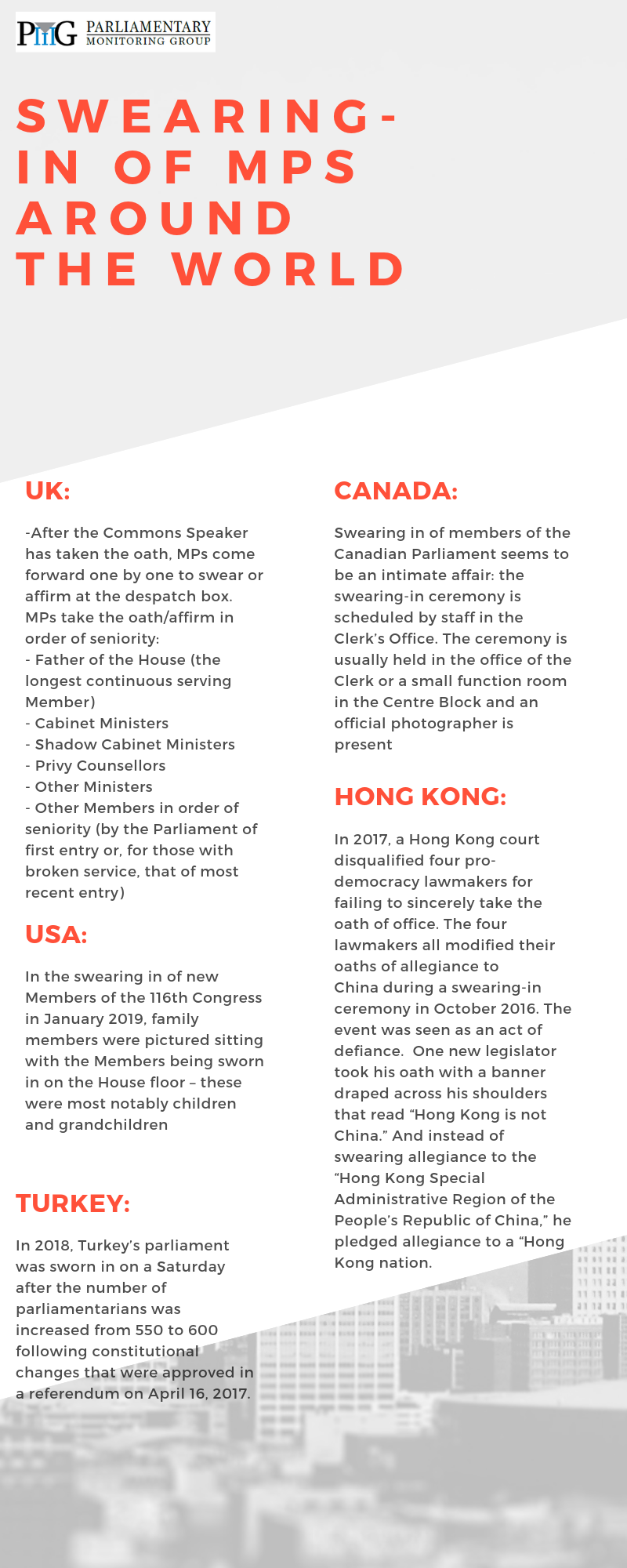Today Members of the National Assembly will be sworn in. These Members represent 14 political parties. Chief Justice Mogoeng Mogoeng will take the Speaker’s seat at 10h30 and in groups of ten, alphabetically organised, he will preside over their swearing in. Each Member will swear or affirm faithfulness to the Republic and obedience to the Constitution.
The oath reads as follows: "I, [Name of MP], swear/solemnly affirm that I will be faithful to the Republic of South Africa and will obey, respect and uphold the Constitution and all other law of the Republic; and I solemnly promise to perform my functions as a member of the National Assembly to the best of my ability." In the case of an oath, "So help me God," will be said at the end.
Also attending the first sitting of the Fifth democratic Parliament will be diplomats and guests of the Presidency, guests of leaders and representatives of political parties in Parliament, and members of the public.
After MPs are sworn in, Chief Justice Mogoeng calls for the nomination of candidates for the position of Speaker of the NA. If more than one nomination is received for the position of Speaker of the National Assembly (NA), an election by secret ballot is held. Counting of the ballots is done in the presence of the Chief Justice. The results are then announced in the House.
Once the Speaker is duly elected, nominations are invited for the position of Deputy Speaker of the NA. The newly-elected Speaker presides over this election. The person who is nominated must indicate acceptance of the nomination by signing either the nomination form or any other form of written confirmation.
Throughout the process, the mace, which represents the Speaker’s authority, will remain upright in front of the National Assembly podium until the newly elected Speaker is escorted to the presiding officer’s chair by the sergeant-at-arms. When the mace is laid horizontally, it signals the official start to the new Parliament.
After an hour’s lunch break the House reconvenes (at 14h00) and the Chief Justice calls for the nomination of candidates for the position of President of the Republic of South Africa. Like the Speaker and Deputy Speaker process, if more than one nomination is made, an election by secret ballot is held. Counting of the ballots is done in the presence of the Chief Justice. The results are then announced in the House. The President, once elected, ceases to be a Member of the NA. The Constitution states that within five days the president-elect must assume office by swearing or affirming faithfulness to the Republic and obedience to the Constitution – this will be done on Saturday, 25 May 2019.
At this event, the President will take the oath or affirmation which reads: "In the presence of everyone assembled here, and in full realisation of the high calling I assume as President of the Republic of South Africa, I, [name of president-elect], swear/solemnly affirm that I will be faithful to the Republic of South Africa, and will obey, observe, uphold and maintain the Constitution and all other law of the Republic; and I solemnly and sincerely promise that I will always promote all that will advance the Republic, and oppose all that may harm it; protect and promote the rights of all South Africans; discharge my duties with all my strength and talents to the best of my knowledge and ability and true to the dictates of my conscience; do justice to all; and devote myself to the well-being of the Republic and all of its people." In the case of an oath, it will conclude with: "So help me God."
While parties are still deciding on the detailed seating order of their MPs, it is traditional that the right side of the House belongs to the ruling party while the left is held by the opposition
Provincial Legislatures
The nine provincial legislatures will also host their swearing-in processes on Wednesday 22 May. The Judge President of each province will preside over the activities which are largely as described above for the National Assembly – after the Members of the Provincial Legislatures are sworn in, the Speakers and Deputy Speakers will be elected. This will be followed by the election of the Premiers. The process will also include appointment of the permanent delegates to the National Council of Provinces (NCOP).
Premiers are expected to announce their executives shortly after they are sworn in.
NCOP
The swearing-in of delegates of the NCOP will be conducted on Thursday, 23 May 2019. The National Council of Provinces is composed of a single delegation of ten delegates from each province. Four of the ten are special delegates and six are permanent delegates. Political parties are entitled to delegates in proportion of their representation. If a person who is a member of the provincial legislature is appointed as a permanent delegate, that person ceases to be a member of the legislature.
The Chief Justice will preside over the swearing in of delegates of the NCOP and election of its Chairperson. The Chairperson will then preside over the election of the Deputy Chairperson, House Chairpersons and Chief Whip. The permanent delegates will be sworn in in groups of six
Representation of political parties in Parliament and the provincial legislatures


Comments
Keep comments free of racism, sexism, homophobia and abusive language. People's Assembly reserves the right to delete and edit comments
(For newest comments first please choose 'Newest' from the 'Sort by' dropdown below.)